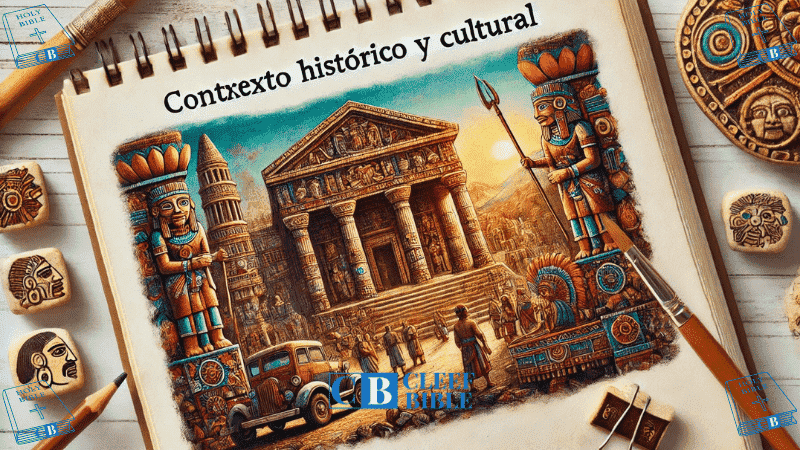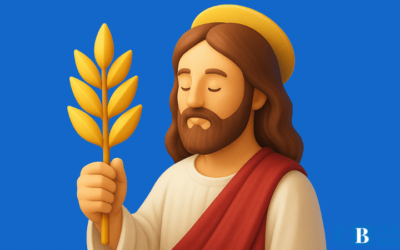Have you ever wondered why God chose Israel and what the significance of that calling is in the Bible?
In Genesis 12:1-3, we find the beginning of one of the most transcendental stories for the Judeo-Christian faith: God's call to Abraham.
This passage not only marks the beginning of Israel's history as a chosen people, but also lays the foundation for a special relationship between God and his people.
Let's explore this fascinating topic in depth.

To understand the Israel's election In Genesis 12:1-3, we must first immerse ourselves in the historical and cultural context of the time.
In Abraham's time, the ancient world was made up of various nomadic tribes who roamed the lands of Canaan and Mesopotamia.
These tribes followed deeply rooted customs and beliefs, many of them centered on the worship of multiple gods and survival through livestock and trade.
Situation of the ancient world in the time of Abraham
In this setting, Abraham and his family lived as nomads, moving from one place to another in search of pastures and water for their flocks.
City-states and kingdoms were common, but so were conflicts and temporary alliances between different tribes.
God's call to Abraham to leave his homeland and his relatives was, in this context, a radical act that would challenge the social and religious norms of his time.
To better understand the situation, let's consider the following points:
1. Social Structure:
The social structure was based on clans and tribes living in closely knit communities.
Loyalty to clan and extended family was of utmost importance, and decisions were made for the benefit of the community.
2. Economy and Livelihood:
The economy of these tribes depended mainly on livestock, grazing and trade.
Resources such as water and pasture were vital to survival, often leading to disputes and migration.
3. Religion and Beliefs:
Most of these tribes worshipped multiple gods and performed sacrifices and rituals to gain divine favor.
Religion was an integral part of everyday life, influencing community decisions and actions.
Customs and beliefs of nomadic tribes
The nomadic tribes of the time had a social structure based on the clan and the extended family.
Loyalty to family and tribe was crucial, and religion played a central role in everyday life.
Local gods were worshipped through rituals and sacrifices, and the idea of a single god demanding exclusivity and obedience was revolutionary.
In this environment, God's call to Abraham to form a great monotheistic nation was a paradigm shift.
Let's look at some important aspects:
1. Religious Practices:
Each tribe had its own specific gods and rituals, which included animal sacrifices and offerings of agricultural products.
These rituals were seen as essential to ensure the prosperity and protection of the tribe.
2. Social Norms:
Social norms were strongly influenced by religious beliefs and roles within the clan.
Important decisions were made in councils of elders and tribal leaders.
3. Nomadic Life:
Nomadic life required constant adaptability to new conditions and territories.
Movements were dictated by the availability of resources and climatic conditions.
God's call to Abraham
In this context of multiple gods and entrenched tribal practices, God calls Abraham to leave his land and family to follow Him to a land He would show him.
This call marks the beginning of a new covenant between God and Abraham, promising that his descendants will be a great nation.
Abraham's call is significant for several reasons:
1. Break with Tradition:
By leaving his land and his family, Abraham breaks with the traditions and practices of his time, demonstrating radical faith and obedience to one God.
2. Promise of Blessing:
God promises to bless Abraham and his descendants, indicating a broader divine plan for humanity.
The promise includes not only material prosperity, but also a spiritual and moral impact on other nations.
3. Formation of a New Identity:
The call of Abraham and the subsequent election of Israel represent the formation of a new identity based on faith in one God.
This monotheistic identity will differentiate Israel from other nations and lay the foundation for future divine revelations and alliances.
The election of Israel and the call of Abraham must be understood in the context of an ancient world filled with diverse beliefs and practices.
Abraham's faith and obedience mark the beginning of a new relationship between God and humanity, a relationship that would challenge the cultural and religious norms of the time and establish a new path for the history of faith.
God's Call to Abraham

In Genesis 12:1-3 God calls Abraham with a promise that will change not only his life, but also the history of humanity.
The divine call
Verse 1: “Go from your country, your family, and your father’s house to the land I will show you.” This instruction is clear and direct.
God asks Abraham to leave everything he knows and embark on a new adventure based solely on faith.
The importance of “leaving your country and your family” lies in abandoning family security and tradition to follow a divine purpose.
Exploring this point further, we can identify several dimensions of this call:
1. Break with the Past:
Leaving his land and family meant abandoning Abraham's roots and cultural identity.
This symbolizes a break with old beliefs and practices, and a step toward a new identity based on faith in God.
2. Challenge to Faith:
God does not reveal his final destination to Abraham, but simply asks him to trust and move forward.
This act of faith is significant, as Abraham must trust God completely without knowing the future.
3. New Mission:
The call includes a mission: to reach a promised land where Abraham and his descendants will establish a new nation.
This land would not only be a physical place, but also a space for the fulfillment of divine promises.
Divine promises
Verses 2-3: “I will make you into a great nation, and I will bless you and make your name great, and you will be a blessing. I will bless those who bless you, and I will curse those who curse you; and through you all the families of the earth will be blessed.”
These promises cover three main aspects: the formation of a great nation, blessing, and fame.
God not only promises to bless Abraham, but also to make him a source of blessing for all the families of the earth.
Breaking down these promises, we can see the following key points:
1. Formation of a Great Nation:
The promise of making Abraham a great nation implies not only an increase in descendants, but also the creation of a community with a divine identity and purpose.
This nation would be a bearer of God's blessing and serve as a model for other nations.
2. Personal and Universal Blessing:
God promises to bless Abraham individually, ensuring his well-being and prosperity.
Furthermore, Abraham would be a channel of blessing to others, extending divine grace beyond his own family.
3. Divine Protection and Justice:
The promise to bless those who bless Abraham and curse those who curse him shows divine protection and justice.
God pledges to defend Abraham and his descendants, ensuring that they are treated fairly.
Abraham's Faith and Obedience
Abraham's response to this call is a supreme example of faith and obedience.
He leaves his homeland, Ur of the Chaldees, and travels into the unknown based on God's promise.
This act of faith has profound implications for believers today, who are also called to trust God and obey him, even when the path is unclear.
To understand the magnitude of Abraham's faith and obedience, let us consider the following aspects:
1. Trust in the Unknown:
Abraham had no map or clear vision of his destiny, he only had God's promise.
Their willingness to move forward shows an unwavering trust in God's faithfulness.
2. Personal Sacrifice:
Leaving his homeland and family was not only an emotional challenge, but also a sacrifice of stability and security.
Abraham had to give up his comfortable life to follow his divine calling.
3. Legacy of Faith:
Abraham's journey impacted not only his life, but also the lives of his descendants and future generations.
His example of faith and obedience became a fundamental pillar of the Judeo-Christian tradition, inspiring many to follow the path of faith.
Genesis 12:1-3 not only recounts God's call and promises to Abraham, but also teaches us profound lessons about faith, obedience, and trust in God.
These lessons are relevant to believers of all ages, reminding us that faith in God requires sacrifice, but brings with it great blessings and a divine purpose.
Meaning of promises

The promises made to Abraham have not only historical significance, but also theological and spiritual significance that transcends generations.
Promise of a great nation
The promise of a great nation is fulfilled in the historical development of Israel. From the patriarchs to the establishment of the Kingdom of Israel under David and Solomon, we see how God fulfills his promise.
Theologically, this promise is seen as a manifestation of God's faithfulness and his redemptive plan for humanity.
To better understand this promise, we can consider the following points:
1. Historical Development of Israel:
The transformation of a small group of people into a powerful nation is a testament to God's faithfulness.
The history of Israel, from its slavery in Egypt to its establishment as a kingdom under David and Solomon, shows how God guides and protects his people.
2. God's Faithfulness:
God demonstrates his faithfulness by fulfilling his promises, regardless of the circumstances.
The formation of Israel as a great nation reinforces the idea that God is faithful to his covenants and promises.
3. Redemptive Plan for Humanity:
The nation of Israel plays a crucial role in God's redemptive plan, since it is from it that Jesus, the Savior of the world, comes.
Israel's election is not only for its own benefit, but to bless all nations through the coming of the Messiah.
Promise of blessing
Blessing in the biblical context implies prosperity, protection, and divine favor.
Abraham and his descendants experienced tangible blessings, but they were also called to be a blessing to others.
This is seen in how the nation of Israel influenced other cultures and religions throughout history.
To explore this promise, let's consider the following aspects:
1. Prosperity and Protection:
God's blessing is manifested in the material prosperity and divine protection that Abraham and his descendants experienced.
God blessed Abraham with wealth, numerous descendants, and a promised land.
2. Source of Blessing for Others:
The promise is not only for Abraham and his family, but extends to all nations.
Israel, as a nation, was called to be a light to the Gentiles and to show the character of God to the world.
3. Cultural and Religious Influence:
Throughout history, Israel has had a significant impact on the world's cultures and religions.
The influence of biblical principles and teachings can be seen in the development of laws, ethics, and morals in various societies.
Promise of fame
“I will make your name great” is a promise that has been fulfilled beyond imagination.
Abraham is a central figure not only in Judaism, but also in Christianity and Islam.
His name is synonymous with faith and obedience, and his fame has endured through the centuries.
To understand the depth of this promise, we can consider the following points:
1. Central Figure in Three Religions:
Abraham is revered in Judaism, Christianity, and Islam, making him a unifying figure across the world's major monotheistic religions.
His life and faith are inspiring examples for millions of people.
2. Synonym of Faith and Obedience:
Abraham's willingness to obey God and his unwavering faith have made him a role model.
His story inspires believers to trust God and follow his commandments, even in difficult circumstances.
3. Lasting Legacy:
Abraham's name has endured through the centuries and will continue to be remembered by future generations.
Its impact on history and theology is profound and will continue to influence humanity.
The promises made to Abraham in Genesis 12:1-3 have profound meaning that spans history, theology, and spirituality.
These promises not only transformed Abraham's life, but also had a lasting impact on human history and on our understanding of God's faithfulness and redemptive plan.
Israel's role in history

Israel, as the chosen people, has a unique and significant role in biblical and world history.
Israel as the chosen people
The concept of “chosen people” implies a special relationship and covenant between God and Israel.
This status carries with it both privileges and responsibilities.
Israel is called to be an example of justice and holiness, reflecting God's character to the world.
To understand this idea, we can analyze several points:
1. Special Relationship with God:
The covenant between God and Israel establishes a unique connection, where God promises to protect and bless Israel.
In return, Israel must follow God's laws and commandments, showing the world the nature of God.
2. Privileges and Responsibilities:
As the chosen people, Israel receives many blessings, such as the promised land and God's constant presence.
However, he also has the responsibility to live according to divine standards, serving as an example of justice and holiness.
3. Example of Justice and Holiness:
Israel is called to live in a way that reflects God's character, demonstrating justice, mercy, and love.
This involves following the Mosaic Law and acting with integrity, influencing other nations through one's conduct.
Israel's relationship with other nations
Throughout its history, Israel has had complex interactions with other nations, from alliances to conflicts.
These relationships have influenced their cultural and spiritual development.
Israel has left an indelible mark on world history, not only as a political nation, but also as a spiritual beacon.
To better understand this dynamic, let's consider the following points:
1. Alliances and Conflicts:
Israel has formed alliances with various nations to protect and prosper, such as the alliance with Egypt and other neighboring nations.
It has also faced significant conflicts, such as the Assyrian and Babylonian invasions, which led to exile and dispersion.
2. Cultural and Spiritual Influence:
Throughout its history, Israel has influenced the culture and religion of many nations, introducing concepts such as monotheism and ethics based on divine law.
This influence can be seen in the Abrahamic religions: Judaism, Christianity, and Islam.
3. Mark in World History:
The biblical narrative of Israel has impacted literature, art, and morality throughout the world.
Israel is seen as a model of perseverance and faith, with its history serving as an inspiration to countless generations.
Prophecies and fulfillment
The prophecies related to Israel and their fulfillment are a testimony to God's sovereignty.
From the promise of the land to exile and return, these prophecies reveal God's redemptive plan and his faithfulness to his promises.
Israel's role in redemption culminates in the coming of Jesus, the Messiah, who brings salvation to all nations.
To explore this aspect, we can consider the following points:
1. Prophecies of the Promised Land:
God promised Abraham and his descendants the land of Canaan, a promise reiterated to Isaac, Jacob, and Moses.
The fulfillment of this promise was seen when the Israelites, under the leadership of Joshua, conquered and settled in Canaan.
2. Exile and Return:
The prophecies of Isaiah, Jeremiah, and other prophets foretold Israel's exile because of its disobedience.
However, they also promised a return and restoration, which was partially fulfilled with the return of the Jews to Jerusalem under the leadership of Zerubbabel and Ezra.
3. Coming of the Messiah:
Messianic prophecies, such as those in Isaiah 53 and Micah 5:2, were fulfilled in the life and ministry of Jesus.
Jesus is seen as the ultimate fulfillment of God's redemptive plan, bringing salvation not only to Israel, but to all nations.
Israel, as the chosen people, plays a crucial role in biblical and world history.
Their special relationship with God, their interactions with other nations, and the fulfillment of prophecies underscore God's sovereignty and faithfulness.
Israel's narrative teaches us about God's justice, holiness, and redemptive plan for humanity.
Impact on Christian theology

The Israel's election has profound implications for Christian theology.
Theology of Election
The doctrine of election is central to both the Old and New Testaments.
God chooses Israel to fulfill a redemptive purpose, and this election extends to all believers through Jesus.
The Christian faith sees election as a calling to be a holy people and to participate in God's mission in the world.
To better understand this idea, we can analyze several points:
1. Redemptive Purpose:
Israel was chosen to be a channel through which God would bring redemption to all humanity.
This redemptive purpose was fulfilled in Jesus, who was born of the line of Abraham and brought salvation to all nations.
2. Extension to All Believers:
Israel's election is expanded in the New Testament to include all believers in Christ.
This is seen in Paul's letters, where he mentions that Gentile believers are grafted into the people of God.
3. Call to Holiness:
Being part of the chosen people implies a calling to live a holy and righteous life.
Believers are called to reflect God's character in their daily actions and to be a testimony of His love and grace.
The descendants of Abraham
Jesus, as a descendant of Abraham, is the fulfillment of the promise of blessing for all nations.
The lineage of faith, which begins with Abraham, extends to all Christians, who are called to live by faith and be a blessing to others.
To understand this in depth, let's consider the following points:
1. Fulfillment in Jesus:
Jesus is the promised descendant through whom all nations would be blessed.
His life, death, and resurrection fulfill the promises made to Abraham and extend God's blessing to all people.
2. Lineage of Faith:
Abraham's faith is the model for all believers.
Christians are called to have the same faith and trust in God, following the example of Abraham.
3. Be a Blessing to Others:
Believers are called to be a blessing to others by living according to the principles of God's Kingdom.
This involves showing love, justice and mercy in all your relationships and actions.
Practical applications
Abraham's lessons of faith and obedience are relevant for Christians today.
We are called to trust God and obey Him, even in the midst of uncertainty.
The mission of being a blessing to others remains central as we reflect God's love and grace in our daily lives.
To apply these teachings, we can follow the following steps:
1. Trust in God:
Like Abraham, believers must trust in God's promises, even when circumstances are uncertain.
This involves active faith and constant dependence on divine guidance.
2. Obey God:
Obedience to God is crucial to fulfilling His purpose in our lives.
Believers must be willing to follow God's commandments and direction, even if it requires sacrifice or effort.
3. Be a Blessing to Others:
Christians should strive to be a blessing in their communities and in the world.
This can be done through acts of service, sharing the gospel, and living a life that reflects God's character.
The election of Israel has profound theological and practical implications for Christian believers.
Through faith in Jesus, all believers are called to participate in God's mission, live in holiness, and be a blessing to others.
Israel and the Church

The relationship between Israel and the Church is a topic of great theological importance.
Parallels between Israel and the Church
There are many parallels between Israel and the Church.
Both are called to be a holy people, set apart for God, and both have a mission to bring God's light to the world.
The history of Israel provides a model and a lesson for the Church.
To better understand these parallels, we can analyze the following points:
1. Call to Holiness:
Both Israel and the Church are called to be holy and live according to God's commandments.
This call to holiness implies a life of justice, mercy and love toward others.
2. Mission of Light:
Israel was called to be a light to the nations, showing the way to God.
Similarly, the Church is called to be the light of the world, sharing the gospel and demonstrating the love of Christ in its actions.
3. History Lessons:
The history of Israel, with its successes and failures, serves as a lesson for the Church.
It teaches us the importance of faithfulness to God and the consequences of disobedience.
The Church as the new Israel
Some theological interpretations see the Church as the heir of the promises made to Israel.
This vision emphasizes the continuity of God's people across generations and the inclusion of Gentiles in God's redemptive plan.
To delve deeper into this concept, let's consider the following points:
1. Continuity of the People of God:
The Church is seen as the continuation of God's people, inheriting the promises made to Abraham and his descendants.
This includes the promise of blessing and the mission to be a channel of blessing to the world.
2. Inclusion of Gentiles:
In the New Testament, the inclusion of Gentiles in the people of God is highlighted.
The Church, composed of Jews and Gentiles, reflects the unity and diversity of God's plan for humanity.
3. God's Redemptive Plan:
The Church participates in God's redemptive plan, bringing the message of salvation to all nations.
This role is an extension of the mission that began with Israel.
Unity in diversity
The inclusion of Gentiles in God's plan is a powerful message of unity and reconciliation.
The Church, as the body of Christ, is composed of people from all nations, reflecting the diversity and unity in God's plan.
To explore this aspect, we can consider the following points:
1. Diversity of Cultures:
The Church encompasses a wide range of cultures and traditions, reflecting the richness of God's creation.
This diversity is a strength and a manifestation of the beauty of the Kingdom of God.
2. Unity in Christ:
Despite diversity, the Church finds its unity in Christ.
Believers, although different in many ways, are united by their faith in Jesus and their commitment to His mission.
3. Reconciliation and Peace:
The Church is called to be an agent of reconciliation and peace in the world.
Through its witness and actions, the Church demonstrates that it is possible to live in harmony and love, overcoming divisions and conflicts.
The relationship between Israel and the Church has profound theological implications.
The parallels between the two—the vision of the Church as the new Israel and the call to unity in diversity—highlight God's redemptive purpose and his plan to include all nations in his Kingdom.
Contemporary reflections

The Abraham's choice and God's promise have continued relevance today.
Relevance of Abraham's call today
God's call to Abraham to leave his comfort zone and follow a new path is a powerful reminder of the importance of obedience in our modern lives.
We are all called to trust God and follow his direction, even when we do not fully understand his plan.
To better understand the relevance of this call, let us consider the following points:
1. Obedience to God:
Abraham's willingness to leave his home and follow God is a supreme example of faith and obedience.
Today, we are called to show similar faith by trusting God in all areas of our lives, even when we face uncertainties.
2. Leaving the Comfort Zone:
Stepping out of your comfort zone can be scary, but it is often necessary to grow spiritually and fulfill God's purpose.
Abraham's story encourages us to take steps of faith and be open to the changes God wants to make in our lives.
3. Divine Direction:
God promises to guide us and provide for us when we follow His direction.
Abraham's experience shows that trusting in God's guidance, even when it seems uncertain, leads to blessings and the fulfillment of promises.
Israel Today
Israel remains a topic of great interest and relevance in the modern world.
Israel's current situation and its role on the world stage present both challenges and opportunities.
To explore this aspect, let us consider the following points:
1. Political Situation:
Israel faces complex political and diplomatic challenges.
Its location in the Middle East and its relations with neighboring countries are topics of constant evolution and international debate.
2. Cultural and Spiritual Heritage:
Israel has a rich cultural and spiritual heritage that continues to influence the world.
Israel's contributions in areas such as religion, science, technology, and the arts are significant.
3. Social Challenges:
The Jewish people face various social challenges, including issues of identity, integration, and coexistence.
These challenges also present opportunities for dialogue, reconciliation, and growth.
4. Collaboration Opportunities:
Israel has the opportunity to collaborate with other nations in areas such as technological innovation, sustainable agriculture, and security.
These collaborations can contribute to global well-being and strengthen international relations.
Abraham's election and God's promises have not only historical significance but also ongoing relevance in modern life.
Abraham's call reminds us of the importance of obedience and faith, while Israel's current situation highlights its continued and dynamic role in the world.
Call for reflection
Finally, I invite you to reflect on God's call in your own life.
How are you responding to God's invitation to step out of your comfort zone and follow Him?
In what ways can you be a blessing to others in your daily life?
Conclusion
The Israel's election in Genesis 12:1-3 It is not just a historical event, but a constant reminder of God's faithfulness and his redemptive plan for humanity.
Through Abraham, we learn about the importance of faith, obedience, and commitment to divine purpose.
The promises made to Abraham not only formed a nation, but also laid the foundation for a spiritual heritage that endures to this day.
As we reflect on these truths, we are challenged to live in ways that reflect God's love and justice in our daily lives.
Have you ever wondered how Abraham's call and Israel's choice can influence your own life?
Share your thoughts and experiences in the comments!
Discover How the Bible Can Transform Your Life
- Bible Study – explore the teachings of the Bible and find answers to life’s challenges.
- Fundamental Beliefs – delves into the principles that have guided millions through the centuries.
- Spiritual Growth – Strengthen your faith with studies designed to bring you closer to God.

Discover How the Bible Can Transform Your Life
- Bible Study – explore the teachings of the Bible and find answers to life’s challenges.
- Fundamental Beliefs – delves into the principles that have guided millions through the centuries.
- Spiritual Growth – Strengthen your faith with studies designed to bring you closer to God.

Frequently Asked Questions about Israel's Election in Genesis 12:1-3
Why did God choose Abraham?
God chose Abraham for his faith and obedience, and to fulfill his redemptive plan through a nation that would be a blessing to all the families of the earth.
How can the promise of being a “great nation” be understood in the current context?
The promise of a “great nation” is understood not only as the physical establishment of Israel, but also as the spiritual and moral influence of Abraham’s descendants in the world.
What does it mean to be a “blessing to the nations” today?
Being a blessing to the nations today means living in a way that reflects God's love, justice, and grace, positively impacting those around us.
What is the relationship between Israel and the Church according to the Bible?
The Bible shows Israel as God's chosen people and the Church as the continuation of this calling, including all believers in Christ as part of God's people.
How does Abraham's call affect contemporary Christian theology?
Abraham's call grounds the idea of election and covenant in Christian theology, showing God's faithfulness and the call to live by faith.
Why is obedience important in the Christian life?
Obedience is a response to faith and God's love, and is essential to living a life that pleases God and fulfills His purpose.
What lessons can we learn from Abraham's faith?
Abraham's faith teaches us to trust God even when we don't fully understand his plan, and to follow him with obedience and trust.
How can we be a blessing to others in our daily lives?
We can be a blessing to others by showing love, compassion, justice, and helping those in need, reflecting God's character in our actions.
What is Israel's role in redemption according to the Bible?
Israel plays a central role in God's redemptive plan, being the people through whom the Messiah, Jesus, came, who brings salvation to all nations.
What challenges does Israel face today?
Israel faces political, social, and religious challenges, including territorial conflicts, issues of national identity, and the need for peace and reconciliation in the region.
Have you ever wondered how you can apply the lessons of Israel's election to your own life?
Leave us your comments and share your thoughts!


























0 Comments